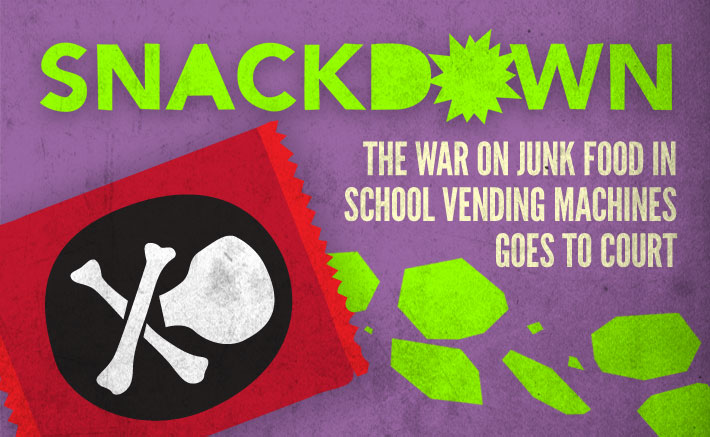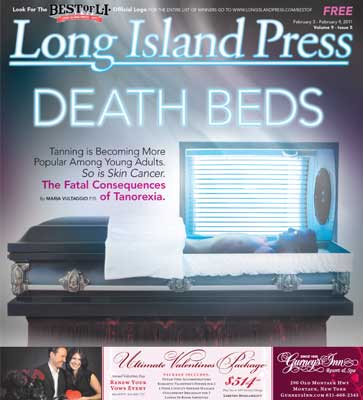
The vending machines in Levittown’s two high schools stood stocked with the most tempting of snacks and beverages for its students: candy bars, cookies and chips to name a few.
For the past several weeks, though, students wishing to snack between classes discovered the machines empty, with no signs explaining the absence of their booty.
Then, on May 15, the mechanical sugar-and-caffeine purveyors themselves disappeared, unceremoniously removed from not only Division Avenue and General Douglas MacArthur High, but wheeled out of the district’s two middle schools, including its education center, by workers of Dover Gourmet Corp.—one of the largest vending machine operators on Long Island.
The abrupt withdrawal is the latest skirmish in a quiet, albeit all-out war currently taking place behind the scenes at Levittown, which was sparked, according to court documents, when Dover failed to adhere to stipulations set forth in its service contract with the school district. Among some of the more damning claims: that the company’s vending machines contained treats with sodium, fat and/or caloric content that were well above the district’s allowable limits and violated its Wellness Policy; that the machines weren’t on timers; that some of the machines’ snacks were specifically outlawed by the contract.
In March the Levittown School Board decided not to renew Dover’s contract. Following a bidding process, the district selected My Healthy Thing, a five-year-old startup that has been making inroads in the local vending machine market—an industry long dominated by waistline-widening goodies. This company stocks its machines with organic fruit, yogurt and smoothies instead of the traditional candy fare. Dover, in response, sued, seeking to block My Healthy Thing from moving in on its turf. A temporary restraining order issued by the judge overseeing the case now bars My Healthy Thing from moving their vending machines into the schools.
Yet there’s more at stake in the unfolding legal battle than just who has snack and beverage rights in Levittown schools. The dispute is the first of its kind pitting an established Long Island vending machine giant such as Dover and its time-worn (though criticized) treats against a new upstart seeking to peddle instead health-conscious tidbits. Whatever happens could set the tone for what Long Island’s students will be munching on between classes into the foreseeable future.
The Dover vs. Levittown and My Healthy Thing fight is also emblematic of a larger assault being waged on a local and national scale against the childhood obesity epidemic, according to an analysis of dozens of LI school vending machines contracts obtained by the Press via Freedom of Information Law requests. The documents detail a trend away from high-sugar beverages and snacks toward healthier vending machine food, despite the financial benefits of signing with companies that offer treats from more well-known brands. Vending machine companies frequently fund scholarships—or, for example, sports equipment like the scoreboard a Pepsi distributor gave Lindenhurst—to help land a contract. All to reach impressionable young minds through their stomachs in the buildings where they spend so many hours of their school day.
The yanking of Dover’s machines was the culmination of a years-long fight waged by a small group of persistent parents-turned-advocates toward that anti-obesity end.
“We’re ecstatic,” Linda Haas, a Levittown official involved in the push, told a local news reporter after the school district’s March vote in favor of My Healthy Thing. “It’s been an ongoing effort for many years. It’s finally come to fruition.”
Even the White House has weighed in on the importance of healthy eating, especially among the nation’s youth.
“We can’t just leave it up to the parents,” First Lady Michelle Obama said at the December 2010 signing of the Healthy, Hunger-Free Kids Act, which mandates more nutritious school food through new federal regulations. “I think that parents have a right to expect that their efforts at home won’t be undone each day in the school cafeteria or in the vending machine in the hallway…Parents have a right to expect that their kids will be served fresh, healthy food that meets high nutritional standards.”
With such momentum, the school is resolute.
“We are optimistic that the court will vindicate our decision,” says Robert Cohen of Lamb & Barnosky LLP, the Melville-based firm defending the Levittown Union Free School District in its move toward more nutritious vending machine snacks.
“We’re totally taken aback by the whole matter,” says Wendy Mikkelson, who founded My Healthy Thing after seeing first-hand the sugary snacks in vending machines at the school her children attend.
Dover, however, and its subsidiary Quick Snack, with more than 1,000 vending machines in schools, parks and government offices across Long Island, is not going down without a fight.
The company charges in its lawsuit that the process unfairly awarded the contract to the competition after it served the district for years. Dover was surprised to see the debate prior to the vote come down to all healthy food or nothing, according to Dan Deegan of Uniondale-based Forchelli, Curto, Deegan, Schwartz, Mineo, Cohn & Terrana, LLP, the law firm representing Dover.
“Do you ban Snickers bars or just mix in healthier choices?” Deegan asks. “Some people might want a Snickers bar once in a while.”





